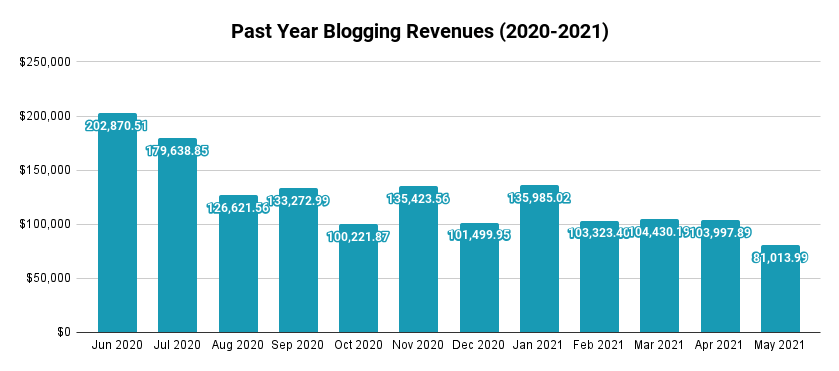How to make money while traveling
I’ve seen it all: virtual assistants, recruiters, brain surgeons, bloggers, yoga instructors, and even lawyers successfully making a living while traveling. Odd jobs certainly reign supreme!
Yet, people who aren’t yet digital nomads always assume that they don’t have the skills needed to live this type of life. They see it as just beyond their reach in order to live the life of a digital nomad.
Nothing could be further from the truth.
In this article I’m going to list out a few of the many many ways you could realistically make money while traveling as a digital nomad.
Note: Being a digital nomad website, I’ll be leaving out jobs that require you to be stationary for any period of time, like an au pair, offline english teacher, tour guide, hostel employee, etc.
Let’s dig in…
1. Blogging
Success from blogging can vary wildly depending on your time investment, and what you’re blogging about.
For example, my good friends have created a beautiful travel blog called Moon and Honey Travel which provides passive income through affiliate marketing and advertising.

Changing gears a bit, our other friend Lauren and her business partner Alex created an enormously successful training course on how to make money as a blogger. Through blogging activities and their training course, the business boasts six-figure income statements per month.

2. Virtual Assistant
What the heck is a virtual assistant, you ask? While many classical “in-office” jobs may have moved out of the office to exclusively online, the need for assistants to make those jobs function properly hasn’t gone anywhere.
As a matter of fact, the lack of access to in-office tools and direct contact with coworkers that these jobs once took for granted, has left these types of employees even more reliant on assistants than they were in the past.
Enter: The virtual assistant.
Virtual assistants do anything ranging from social media activities to bookkeeping and calendar management. No matter your skill set, I can 100% guarantee there is someone out there who could use your help. Here’s some job boards for virtual assistant gigs:
PRO TIPS: While virtual assistant jobs are indeed numerous, they generally don’t require specialized skills, and as such are lower pay. Don’t expect anything lucrative to pop up in your job search, but do expect a high level of flexibility.
3. Writing
Thank. Goodness. For. The. Internet.
Seriously though, writers used to be required to go into the office and endure all the journalism cliches you can think of — I know, I used to work at one of those companies. Imagine rows and rows of journalists glued to their computers hammering out their daily word counts. And for what?
With the relentless demand for content marketing, and a dash of enablement from the pandemic, content writers have increasingly been able to hit their word counts from the road.
And here’s the kicker: Content writers are actually starting to get paid a respectable salary. According to ZipRecruiter, the average content writer is pulling in a hair over $50k per year.
Our own Beach Commuter Michael Bayba is an awesome example of a writer who’s made an awesome and profitable life for himself.

PRO TIPS: There are pros and cons to working as a freelance writer versus working for a company. You’ll need to weigh the freedom of working (or not working) whenever you want versus the security of always having a paycheck. Some people even pick up writing as a way to score some extra money.
4. Marketing
At first blush you might not think that marketing is a digital nomad-friendly type of gig, but I can assure you that it most certainly is. I’ve been a digital marketer for over ten years, with extreme wifi bandwidth demands for hours and hours of calls, and I’m able to make it work without a hitch.
Not only that, but I’ve managed to become a Chief Marketing Officer for the world’s largest content marketing company while doing it. I don’t say this to toot my own horn, but rather as an effort to convince you that it is absolutely possible to do, and do well.
Let’s take a look at some of the disciplines in marketing that are super digital nomad-friendly:
- Search Engine Optimization (SEO): This is my specialty. I’ve spent years and years learning how to get keywords to rank in favorable positions to help businesses drive traffic and commerce through their websites. This work can be done just about anywhere and with minimum bandwidth, both freelance and internally for companies.
- Social Media Strategist: I can’t think of any company with a website that can get away with not having some sort of social media presence. Jobs can be had both freelance and for individual companies.
- Project Manager/Coordinator: Marketing projects need to be managed in order to be completed. Simple as that. Without project management, you would have a bunch of people like me coming up with ideas and nothing getting done.
There are dozens of positions adjacent to marketing: Video production, email marketing, PR, web analytics, marketing strategist, you name it.
Hop on LinkedIn, click “Jobs”, enter “Marketing”, and select “Remote” in the “Locations” field.


5. Graphic Design
Graphic design has a wide range of applications and functions. I’ve met graphic designers that specialize in nearly any area you can think of:
- Logo design and branding
- Content formatting (ebooks, white papers, ebooks, presentations, etc.)
- Web design and UX
- App design and workflows
- Creative team lead
An added benefit of graphic design work is that it lends itself well to both freelance-style work and working full-time for a company. I’ve met people who run their own businesses and maintain client portfolios, others who take on occasional freelance contract work, and others who work full-time for an organization.
And, in my experience, most graphic designers spend the majority of their time working independently, with very few meetings. Having low wi-fi needs makes remote work that much easier.
6. Programming
Programming is easily the most common career I see in the realm of digital nomads, and there’s a few reasons for that.
- They were pioneers: Programming has a long history of outsourcing work to other countries. In other words, employers have come to expect that their programmers will be working remote, if not on an entirely different continent.
- You can do it anywhere: Following on the previous train of thought, programmers are able to do all of their work locally on their computer. All of the tools they need are readily available.
- Demand is high: It’s a very good time to be a programmer; demand and compensation is as high as it’s ever been.
- Wifi demands are low: Programming work can be easily uploaded and downloaded with minimal wifi. This gives programmers extra freedom when deciding which countries (with weak wifi) they want to visit.
- Opportunities are flexible: I’ve seen programmers work at nearly every capacity, whether it be picking up a freelance gig, working for a company, running their own business, or a combination of these. It’s the ultimate work and travel job.
All of these reasons sound amazing, right? It’s not a total walk in the park. The skill set required to be a successful programmer is fairly advanced, and the learning curve is steep. Most programmers start their careers very young, learning programming as though they were learning a language.
PRO TIPS: I’m told that it’s never too late to learn programming. After interviewing a couple programmers for this piece I learned that there is a plethora of online learning material. Check out codeacademy.org, and my friend’s training program at mikedane.com.
Other notable ways to make money while traveling
The previous six careers are only those that I’m the most familiar with; it’s certainly not an exhaustive list. We’ve seen just about every type of career you can think of.
Some other ideas worth considering are:
- Customer support
- Teaching English online
- Traveling yoga instructor
- Travel photography
- Traveling dance instructor.
- HR
- Recruiting
If you take anything from this resource, it should be that there are many, many ways you can make money while traveling. And, you don’t necessarily need to have an unobtainable skill set to do them. I know a few people who quite literally fell into their jobs, then started working remote shortly after.
If you have any questions about any of these jobs, let me know. Every type of career listed comes from a person that we personally know.
